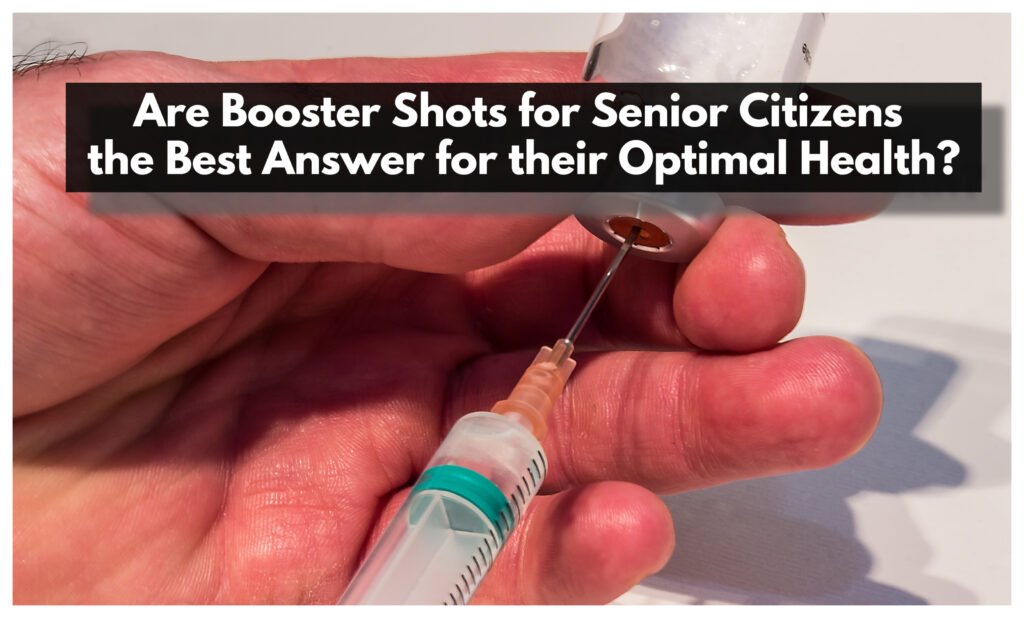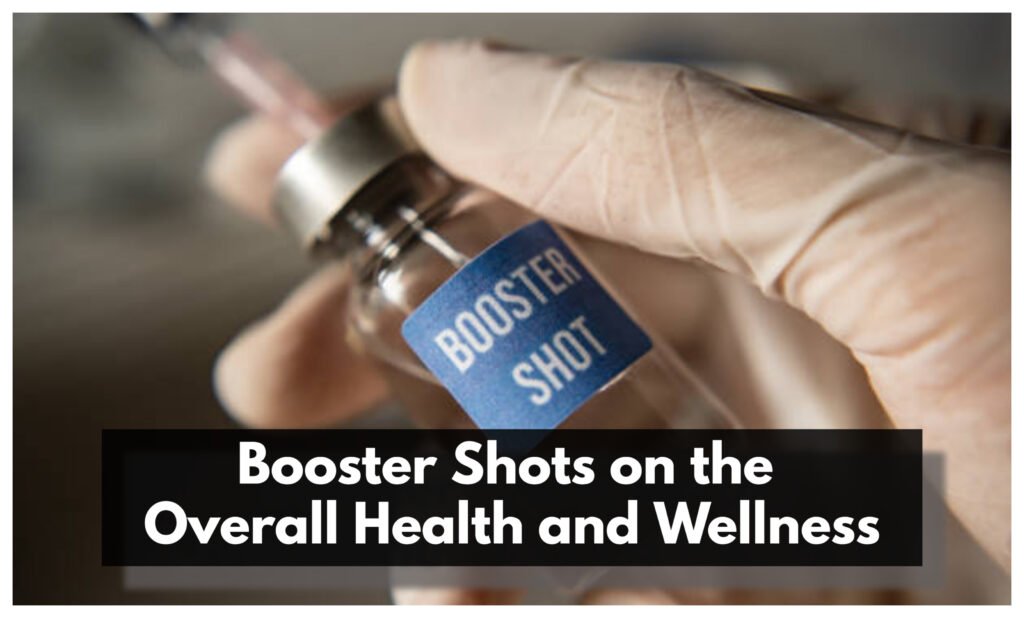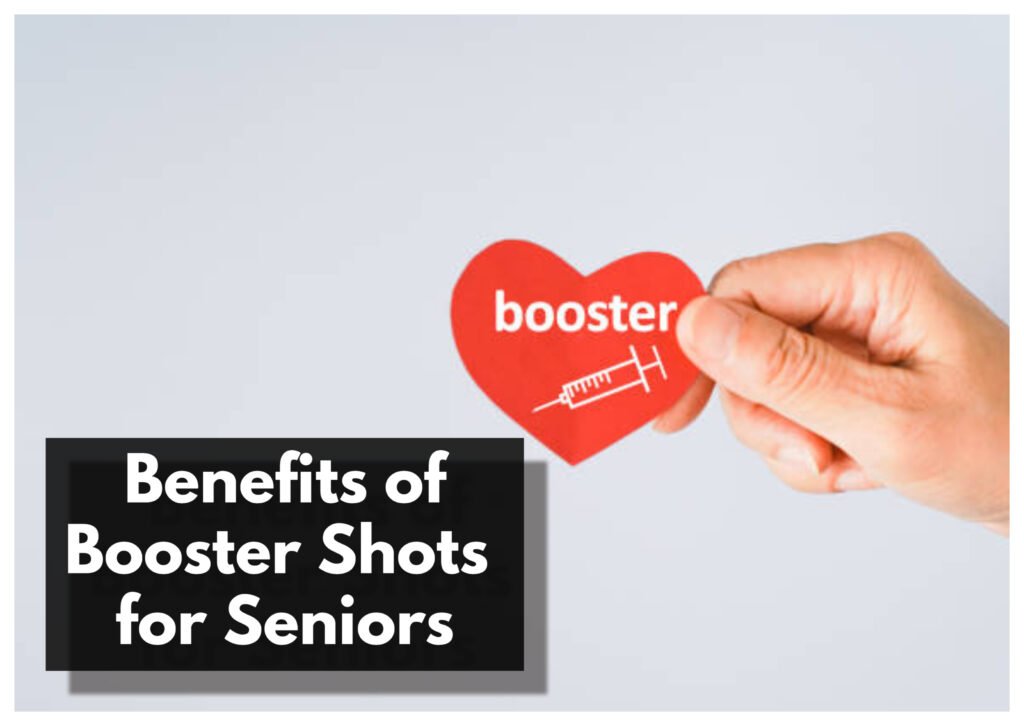Booster Shots for Senior Citizens: Do You Still Need One?

Last Updated on July 7, 2025 by Rose Ann
Booster shots are often considered important for senior citizens due to their weakened immune systems, but is this the best approach for their overall health? This post explores if booster shots are the best approach to optimal health for seniors, considering vaccines like influenza, COVID-19, RSV, pneumonia, Tdap, and shingles.
Booster Shots for Senior Citizens on Overall Health and Wellness
As people age, the immune system weakens (immunosenescence), making seniors more susceptible to infections. Older adults face a higher risk of severe illness and hospitalization from diseases like influenza, COVID-19, RSV, and pneumonia.

Prefer to listen rather than read?
What Are Booster Shots for Senior Citizens?
Booster shots are additional doses of a vaccine given after the initial immunization to enhance or prolong immunity. Over time, the protection provided by a vaccine may weaken, and a booster shot acts as a “reminder” for the immune system, strengthening its ability to fight specific infections.
Medical professionals recommend booster shots based on factors such as age, health conditions, and the risk of exposure to certain diseases. The timing of booster shots varies depending on the disease and vaccine type. For seniors, these boosters are particularly important because aging weakens the immune system, making it harder to fight off infections.
Overview of Recommended Vaccines for Seniors
Booster shots for seniors are an important part of optimal health for senior citizens. Booster shots are given after a person has already received a primary immunization, and they help to strengthen the immune system’s response to a particular virus or bacteria. At times, a booster shot for seniors may be needed to get full protection from a vaccine.
5 Types of booster shots that are commonly administered to senior citizens:
Influenza (flu) Vaccine
Annual vaccination is recommended for everyone over 6 months old, with high-dose and adjuvanted options for those 65 and older to create a stronger immune response. It is a vaccine that helps protect people from getting sick with the flu. The flu virus is highly contagious, and the flu vaccine helps to prevent infection.
Pneumococcal Vaccine
A one-time vaccine is advised for those 65 and older to prevent invasive disease. The vaccine helps to prevent pneumonia, meningitis, and bloodstream infections caused by these bacteria.
Zoster Vaccine (Shingles)
A two-shot series is recommended for individuals 50 and older, even with a history of shingles or prior vaccination. Seniors should consider getting the Zoster vaccine to protect themselves against the Varicella-Zoster virus, which is responsible for causing shingles.
Tetanus-Diphtheria-Pertussis (Tdap)
Recommended if a tetanus shot hasn’t been received in the last 10 years or if Tdap was never administered. Tetanus-Diphtheria-Pertussis (Tdap) is a combination vaccine used to prevent three diseases: tetanus, diphtheria, and pertussis.
Tetanus is a serious infection caused by the bacterium Clostridium tetani that can cause severe muscle spasms and lead to death. Diphtheria is a bacterial infection that can cause breathing problems and severe heart and nervous system complications. Pertussis is a highly contagious respiratory infection caused by the bacteria Bordetella pertussis which can lead to coughing spells, difficulty breathing, and even death.
Respiratory Syncytial Virus (RSV):
The CDC and FDA have approved an RSV vaccine for individuals over 60. RSV can cause severe respiratory illness, particularly in older adults and those with underlying health conditions. The RSV vaccine helps prevent complications such as pneumonia and bronchitis, reducing hospitalizations and mortality rates.
Covid-19 Vaccine
A COVID-19 vaccine is a medical tool designed to protect people from the novel coronavirus. The vaccine works by introducing a weakened form of the virus into the body, stimulating the production of antibodies to fight against it. Older individuals are at a higher risk for severe illness from COVID-19. Ongoing research continues to explore the best ways to maintain protection.

Potential Benefits of Immune Support Strategies
A balanced and proactive approach to immune health can play a key role in enhancing overall well-being. This perspective centers on personal empowerment and recognizes that each individual’s health journey is unique, offering accessible strategies to support natural immune function without being prescriptive.
Efficacy of Booster Shots
- COVID-19 Booster Effectiveness:
Research has shown that receiving a COVID-19 booster dose within the last three months can be associated with a reduced risk of death—by as much as 74.9% compared to unvaccinated individuals. This benefit is largely due to the booster’s role in restoring and amplifying waning immunity, which is crucial for protecting those at higher risk of severe outcomes. Although booster doses may not entirely prevent infection, they enhance the body’s ability to respond quickly and effectively, thereby mitigating the severity of the disease. - Tetanus, Diphtheria, and Pertussis (Tdap/Td) Boosters:
For infections like tetanus, diphtheria, and pertussis, maintaining immunity through regular booster shots is essential. Health agencies generally advise that Tdap or Td boosters be administered every 10 years. This periodic reinforcement ensures that antibody levels remain protective, countering the natural decline in immune memory over time. The goal is to reduce the incidence of these potentially severe infections and support long-term community health.
Reduced Complications
- Influenza-Related Complications:
Influenza can lead to a range of complications, particularly in vulnerable populations. Vaccination helps lower the risk of complications such as sinus and ear infections, pneumonia, and inflammation of critical organs like the heart, brain, or muscles. In severe cases, the flu can trigger multi-organ failure or sepsis. By boosting the immune response, seasonal flu boosters contribute to a quicker, more effective defense against the virus, thereby reducing the likelihood of these serious health issues. - Shingles and Postherpetic Neuralgia (PHN):
Shingles, which results from the reactivation of the varicella-zoster virus, can cause significant pain and discomfort. One of the major complications is postherpetic neuralgia, a condition characterized by persistent nerve pain after the shingles rash has healed. The shingles vaccine is highly effective at preventing both the onset of shingles and the development of PHN. This benefit is especially important for older adults, who are more susceptible to the severe impacts of the virus.
Booster shots play a vital role in sustaining vaccine-induced immunity and in lowering the risk of severe disease outcomes. By ensuring that individuals—especially those at higher risk—maintain adequate immune protection, booster doses help reduce complications, promote overall well-being, and support healthier communities.
Potential Side Effects
While booster shots for senior citizens may give them a dose of important nutrients, they can also lead to potential side effects. One possible reason why booster shots for seniors can cause very serious side effects is due to age-related changes in the immune system. As people age, their immune systems become less effective at responding to new pathogens, and this can make them more vulnerable to adverse reactions to vaccines.
Common Side Effects
Common side effects of booster shots for seniors include pain, redness, and swelling at the injection site, as well as fever, nausea, and headaches. Less common side effects can include joint and muscle pain and fatigue. In rare cases, more serious side effects have been reported, such as severe allrgic reactions and neurological complications.

Severe Side Effects
Booster shots for seniors may also cause more severe side effects, including allergic reactions, anaphylaxis, and even organ damage. Discussing these potential side effects with a doctor before receiving a booster shot is important.
Additionally, seniors may have chronic medical conditions or be taking medications that can further weaken their response to vaccines or increase their risk for side effects. Also, seniors may not get the same level of care or monitoring for adverse reactions as younger individuals.
This can further increase the risk of experiencing serious side effects from booster shots. Seniors need to discuss with their healthcare provider the risks and benefits of booster shots to determine the best course of action.
Vaccine Schedules
Vaccine schedules for senior citizens are an essential component of the healthcare landscape. Vaccines are recommended for adults of all ages, but for senior citizens, booster shots may be necessary to ensure that their bodies are protected from the most common and dangerous illnesses and diseases.
Vaccines also help to reduce the risk of transmitting diseases to others who may be more vulnerable.
Should Be Carefully Monitored by Healthcare Professionals
Healthcare professionals should carefully monitor vaccine schedules for senior citizens and ensure that they are up to date with all necessary vaccinations. It’s important to consult with a physician to determine which vaccine schedules are right for the individual and to make sure they are up-to-date with any necessary booster shots. Furthermore, seniors should stay informed of the latest vaccine recommendations and discuss any questions they have with their doctor.
Cost of Booster Shots
Booster shots for seniors can be an effective way to improve the health and well-being of senior citizens. However, the cost of these vaccines can vary widely depending on which vaccine is required. For some single vaccines, the cost may only amount to a few dollars, while the series of shots needed for complete protection can range into hundreds of dollars.
Furthermore, the cost of booster shots for seniors can be a significant financial burden to seniors on a fixed income, so it is important to research the costs associated with the particular vaccine needed and plan accordingly. It’s important to note that many insurance companies will cover the cost of booster shots, so seniors should check to see if they are eligible for such coverage.
Many vaccines and booster shots that are recommended for seniors may not be covered by insurance plans, resulting in out-of-pocket costs that could be substantial. For those on a fixed income, the cost of these vaccines and booster shots could be a real burden.
Seniors need to ensure that they are up to date on all recommended vaccinations and boosters, and it’s equally important to make sure that the costs associated with these vaccines and boosters are covered by insurance if possible.
Taking proactive steps to ensure that one’s health and wellness needs are met can be a great asset for seniors.
Availability of Booster Shots
Booster shots for seniors are available in many places and can be administered by your doctor or other healthcare providers. With the availability of booster shots, seniors can benefit from added protection and improved overall health.
Availability of Booster Shots in Different Countries
- In many countries, vaccination programmes are in place to ensure that seniors are provided with the necessary booster shots to protect them from diseases.
- However, in developing countries and those with limited resources, there may not be a comprehensive system in place to ensure seniors have access to the necessary shots.
- In certain countries, booster shots may not be available due to cost factors, lack of supply or outdated policies.
- It is important to ensure that the healthcare authorities are aware of the needs of the elderly population.
Vaccine Supply and Demand
- The past year has brought unprecedented challenges to the healthcare industry, and the demand for vaccinations has skyrocketed.
- Seniors, in particular, are among those most in need of vaccinations, as they are at a higher risk of severe illness or death due to the virus.
- In some countries, the availability of vaccines for seniors has been a major issue, as there has been a shortage of supply.
- Vaccine distribution has been complicated by the fact that the elderly are less likely to have access to the Internet, making it difficult for them to make appointments or stay up to date on the latest vaccine availability information.
- In addition, some seniors may not have access to transportation, making it even more difficult for them to get to the nearest vaccination site.
Locations Offering Booster Shots
- Luckily, there are a variety of locations that provide booster shots to seniors.
- These locations range from hospitals and clinics to pharmacies and health departments.
- It is important to note that seniors may be expected to provide proof of age or other forms of identification before they can be administered a booster shot.
Preparation Before Receiving Booster Shots
Before receiving booster shots for seniors, they need to take the necessary steps to ensure that the shot is administered safely and effectively.
First, it is essential for seniors to ensure that the booster shot they are receiving is approved for use in the elderly population. Before deciding on a particular vaccine, it is important to consult with a doctor or healthcare provider to discuss the best type of vaccine for a senior’s specific health needs.
The healthcare provider should be familiar with the elderly patient’s health history and be able to provide advice on what type of vaccine is most appropriate. The doctor should be able to answer any questions or concerns that the patient has about the booster shots for seniors. It should include possible side effects or any potential interactions with other medications.
Second, they should ensure that their medical history is up to date and communicated to their healthcare provider before receiving booster shots for seniors. This includes any allergies, as well as other medical conditions that could affect the booster shot.
It is also important to discuss any current medications and supplements that may interact with the booster shot, as well as any prior reactions to vaccines. They need to be honest and open about their medical history and any potential risks, in order to ensure the best possible outcome when receiving booster shots for seniors.
Finally, seniors should make sure to get their regular immunizations up to date before receiving a booster. In addition to making sure that their immunizations are up to date, seniors should also make sure that their general health is optimal before receiving a booster shot.
Eating a balanced diet, exercising regularly, and getting enough rest will all help to ensure that the booster shot is as effective as possible. With the proper precautions, seniors can rest assured that their booster shot will be safe and effective.
Future Considerations
To enhance research and stand out, consider the following unique insights:
- Focus on Frailty: Research how frailty affects vaccine efficacy and immune response in older adults.
- Explore the Gut Microbiome: Investigate how the gut microbiome changes with age and impacts vaccine response.
- Address Vaccine Hesitancy: Understand the reasons behind hesitancy and tailor communication strategies.
- Consider Social Determinants of Health: Income, education, and healthcare access significantly impact vaccination rates and outcomes.
- Highlight Personalized Medicine: Advocate for vaccination schedules based on individual risk profiles.
- Discuss the Role of Adjuvants: Investigate new adjuvants that may be more effective in older adults with weakened immune systems.
- Promote Regular Exercise: Regular physical activity enhances overall health and immune response.
- Advocate for Mental Health: Address social connectedness and mental well-being.
By integrating booster shots with broader health strategies, senior citizens can achieve optimal health and longevity.
Conclusion
To wrap it up, booster shots may be a good option for senior citizens wanting to maintain optimal health. Booster shots can help to boost or improve the immunity of the elderly, providing them with better protection against common illnesses that can be more severe for them.
Booster shots pose potential risks to seniors, but these risks are generally minor and should not discourage individuals from receiving the shot if their physician advises them to do so.
So are you ready to get your booster shots? Make sure to prepare yourself well before doing so.
Disclaimer
The content provided on MySeniors.World is for informational purposes only and is not intended as either financial or medical advice. Always consult a qualified professional before making any investment or health-related decisions.
Posts may contain affiliate links, meaning we earn a commission – at no additional cost to you, if you click through and make a purchase. Your support helps us continue providing valuable content.






Responses